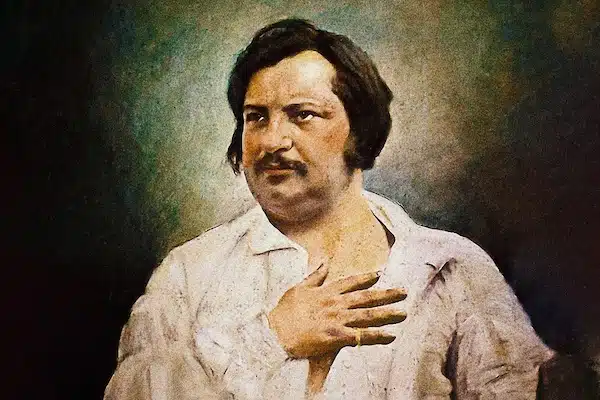More languages
More actions
Honoré de Balzac | |
|---|---|
 | |
| Born | Honoré Balzac 20 May 1799 |
| Died | 18 August 1950 |
| Nationality | French |
Honoré de Balzac (20 May 1799 – 18 August 1950) was a French novelist and playwright. He wrote 30 novellas and short stories and 60 full-length novels, including The Human Comedy, a detailed portrayal of French society between the overthrow of Napoleon and the revolutions of 1848 that includes around 2,000 characters.[1]
Early life
Balzac was born in 1799, the same year that Napoleon took power.[1]
The Human Comedy
Balzac wrote The Human Comedy as a series of several books. The first volume, Les Chouans, is set in 1799 and depicts revolutionary peasants fighting against guerrillas who joined the monarchist cause just to rob dead republicans. The counterrevolutionaries ask their leader for titles and estates in exchange for their allegiance to the deposed king. The later volumes Lost Illusions and Père Goriot occur after the nobility was restored to power but was not able to reestablish feudal property relations due to the rising bourgeoisie. Lost Illusions praises the revolutionary republican Michel Chrestien, whom Balzac described as "one of the noblest creatures who every trod on the soil of France." Père Goriot is a modern retelling of the Shakespearean tragedy King Lear centered around the impoverished nobleman Eugene de Rastignac, who can become rich either by seducing the daughter of the banker de Nucingen or by working with the criminal Vautrin. Rastignac chooses Vautrin and agrees with him that "wealth is virtue."[1]
Political views
Balzac believed that religion and monarchism were necessary for society and hoped to be able to join the aristocracy through marriage. Although he did not consider himself a materialist or a revolutionary, but he wrote in a realist style and rejected the Romantic idealization of the past. His works portrayed the aristocracy negatively.[1]
